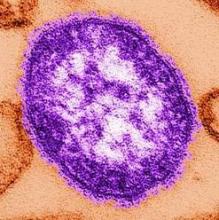Measles is a threat that we need to take seriously, both domestically and when traveling anywhere abroad.
During 2011, the United States had more cases of measles than we have had in 15 years. There were 222 cases and 17 outbreaks of measles reported to the Centers for Disease Control and Prevention from 31 different states. This is a concern and a warning. It’s the highest number since 1996, when there were 508 cases.
Of those 222 cases, 200 were associated with importations from other countries. This includes both people who themselves traveled and became ill and/or imported the virus and those who were exposed to imported cases and themselves became ill. Most of the cases were not vaccinated against measles (65%) or didn’t know if they were vaccinated (21%). Of the 166 U.S. residents who were unvaccinated or had unknown vaccination status, 85% were eligible to get the measles-mumps-rubella (MMR) vaccine based on age and other factors. Of those 141 people, 66 (47%) were between the ages of 16 months and 19 years of age, and another 18 (11%) were under 1 year and, therefore, too young for vaccination. Of the 66 between 16 months and 19 years of age, 50 (76%) had not been vaccinated because of a philosophic, religious, or personal objection (MMWR 2012;61:253-7).
People who choose not to vaccinate themselves or their children are putting themselves and others at risk, particularly infants who are too young to receive the vaccine, and those who are immunocompromised and can’t receive the live attenuated MMR vaccine. Globally, 164,000 people die each year from measles. Nobody has died in the U.S. outbreak so far, but 70 of the 222 (32%) in 2011 were hospitalized.
Nearly half of the 72 known actual importations from other countries were from Europe. We don’t typically think of Europe as a high-risk region for infectious disease, but measles has taken hold there in a big way. Of the 30,567 measles cases reported in the continent in 2011, half – 15,206 – were in France and another 5,181 in Italy, both popular destinations for U.S. travelers.
There is growing concern now about the risk of measles transmission at the Olympics, to be held in July in London. The United Kingdom reported 1,083 cases last year. This year, hundreds of thousands of visitors are
expected for the Olympics. The infectious disease community is advising all travelers to receive measles vaccination at least 2 weeks prior to traveling.
The concern is not limited to travelers to Europe, of course, but extends throughout the world, as outbreaks have been reported in New Zealand, Ecuador, much of Africa, and even Canada. Montreal is currently experiencing an outbreak, with 776 cases reported in the province of Quebec between Jan. 1 and March 31 of this year.
The CDC’s Advisory Committee on Immunization Practices, the American Academy of Pediatrics, and the American Academy of Family Physicians recommend that people of all ages receive MMR. It is given routinely to children at 1 year of age and again at kindergarten entry (4-6 years). The travelers’ recommendation is that any child aged 6-12 months who is eligible receives one MMR dose prior to travel and everyone aged 12 months or older who is eligible receives two MMR doses prior to travel, separated by 28 days.
The MMR vaccine recommendation for travelers has been the same for more than 20 years, but people never really thought about it in terms of travel to Europe or Canada. Also, many adults assume that they were vaccinated as a child. Adults born prior to 1957 are presumed to have been exposed to natural measles and are therefore generally assumed to be immune. Routine measles immunization with one dose began in the mid-1960s, and the two-dose schedule was first recommended in 1989. Since approximately 5% of people don’t respond to the first vaccine dose and many people are unsure of their vaccination history, a substantial proportion of adults are currently susceptible.
Physicians should be prepared to respond to questions regarding MMR vaccine eligibility and should look for documentation of two MMR vaccines.
Summer is travel time, and measles vaccine is now a priority for our patients who are traveling.
Dr. Jackson is the chief of infectious diseases at Children’s Mercy Hospitals and Clinics in Kansas City, Mo., and professor of pediatrics at the University of Missouri–Kansas City. She said she has no relevant financial disclosures.


